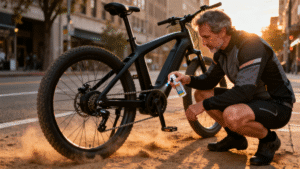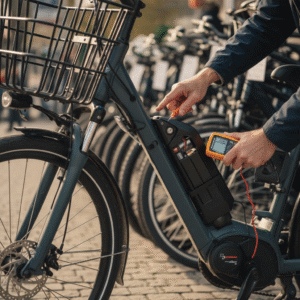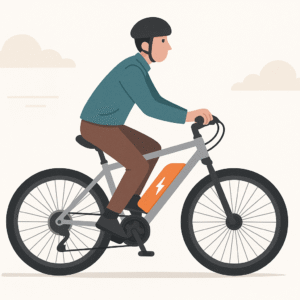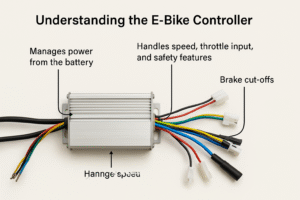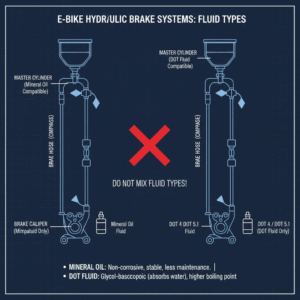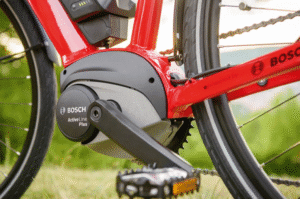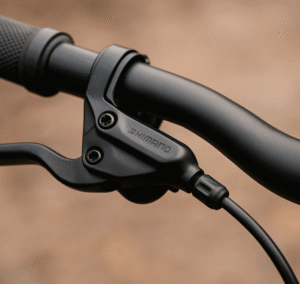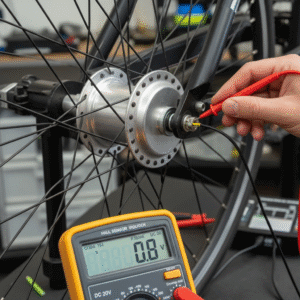Summary
Costco has expanded its electric bike selection in 2025, offering a mix of folding commuters, fat-tire all-terrain bikes, and everyday e-cruisers at wholesale prices.
The lineup spans budget-friendly foldable models around $600 up to feature-rich e-bikes nearing $2,000, all backed by Costco’s generous return policy and customer service. Key models like the Jetson Haze and Jetson Bolt Pro cater to urban riders with compact frames and ~15–25 mile ranges, while mid-tier options such as the Sondors Smart Step LTD and Magnum Cruiser 2.0 bring larger batteries and rugged components for longer rides.
Costco’s e-bikes emphasize quality components (e.g. Shimano gears, LG batteries) and ease of use over ultra-high performance, making them ideal for beginners and casual riders. In this review, we’ll break down Costco’s current e-bike models (in-store and online), their prices and specs, and weigh the pros and cons of buying from Costco versus Amazon, local bike shops, or direct-to-consumer brands.
Costco’s 2025 E-Bike Selection at a Glance

Costco’s electric bike offerings in 2025 cover a diverse range of types and price points. Both in warehouses and on Costco’s website, you’ll find everything from ultra-compact folding e-bikes to fat-tire all-terrain models, plus a few standard commuter bikes. In the U.S., Costco tends to stock more entry-level and mid-range e-bikes focused on value and portability, whereas Costco Canada features some premium models with higher power and range. Typically, a local warehouse might display 3–5 e-bike models at a time (often seasonal), while many more options are available online – including some via Costco’s partnership program “Costco Next,” which gives members special discounts on brands like Jupiter Bike.
In-Store vs. Online: In-store inventory usually centers on popular models that appeal to a broad audience (often foldables and cruisers). Buying in-store means you can see the bike assembled and even get minimal assembly help on the spot. However, not every model is on the floor – online you’ll find a wider selection, sometimes with higher-end specs or niche styles (like performance folding bikes or long-range commuters). Online orders often arrive partially assembled (about 85% assembled, per Costco’s guidance), and you may need to attach the front wheel, handlebars, or pedals yourself. For those uneasy with assembly, Costco has been known to partner with mobile bike assembly services in some areas and offers Concierge support for electronic components during the initial warranty.
Folding and Compact E-Bikes at Costco
Folding e-bikes are a Costco specialty, perfect for apartment dwellers, RV travelers, or commuters short on storage space. Jetson, a brand prominently featured at Costco US, offers some of the most affordable and portable models. The Jetson Bolt Pro and Jetson Haze are two well-known examples. The Jetson Haze, for instance, is a 16-inch wheel folding e-bike with a 350W rear hub motor and roughly a 15-mile range per charge. Priced around $600, it’s ultra-compact and lightweight, making it easy to toss in a car trunk or carry upstairs. The Jetson Bolt Pro is similar, pairing a 350W motor with a simple folding frame and pedal-assist up to ~20 mph; it often goes on sale for around $500-$600 (and has even been spotted under $400 during promotions).

Another folding option available through Costco is the Jupiter Discovery X5, a slightly larger folding bike with ~20″ wheels. The Discovery X5 offers a 350–500W motor (varying by assist mode) and a longer range of about 25–40 miles, making it a step up for those who need a bit more power or distance. Its price tends to hover around $1,200 (give or take, depending on configuration and Costco member discounts). For Canadian shoppers, the Envo Lynx is a popular folding model at Costco Canada – a 500W, 20″ wheel folder with ~24–48 km range, built tough for year-round commuting.
Key features of Costco’s folding e-bikes include easy-fold hinges, manageable weights (often under ~45 lbs), and basic suspension or fat tires to smooth out the ride. They typically have 250W to 500W hub motors – enough for city speeds and mild hills. While their smaller batteries keep ranges modest (15–30 miles in many cases), these bikes excel in convenience. Riders praise models like the Jetson for being “perfect for city dwellers who need a portable bike”. Just keep in mind that compact e-bikes have smaller wheels and may feel twitchier on bumpy roads, and their limited top speeds/class (often Class 2, 20 mph max) mean they’re best for shorter urban trips.
Fat-Tire and All-Terrain E-Bikes at Costco
For those looking to tackle sand, snow, or trails, Costco offers a few fat-tire e-bikes with beefier frames and motors. One standout is the Jupiter Defiant All-Terrain Foldable E-Bike, which brings off-road capabilities in a folding package. The Defiant sports 20″ x 4″ fat tires, a powerful 750W hub motor, a 48V battery, and 7-speed Shimano gearing. With a range of up to ~60 miles per charge, it’s built for longer rides on tougher terrain. This model is priced around $1,999 at Costco – leveraging the warehouse’s bulk pricing to undercut many competitors for a 750W fat-tire folder. Riders who want a folding bike that doesn’t shy away from dirt or snow will find the Defiant compelling, given its blend of portability and power.
Costco has also carried non-folding fat-tire cruiser bikes. The 101 Urban (an in-house or lesser-known brand model) and Magnum Cruiser 2.0 are examples of full-size fat-tire e-bikes seen on Costco’s website. The Magnum Cruiser 2.0 features a 500W rear hub motor, a 624 Wh battery, and can reach Class 3 speeds (~28 mph) – making it one of the faster bikes in Costco’s lineup. With its upright riding posture and 26″ x 4″ tires, it’s a comfortable cruiser for beach or trail, priced around $1,399. The 101 Urban is a 4.5″ fat-tire bike reportedly equipped with a 750W motor (capped at Class 2, 20 mph) and hydraulic brakes, roughly in the $1,499 price range. These higher-power bikes give Costco shoppers a taste of true all-terrain performance – ideal for sand, gravel paths, or winter slush – without venturing into specialty e-bike boutiques.
Pros: Fat-tire e-bikes from Costco deliver stability and comfort. The wide tires float over soft ground and soak up bumps, and the strong hub motors (500W–750W) provide plenty of torque for hill climbing or hauling gear. The value is a big plus – it’s not common to find a folding 750W fat bike under $2k with a reputable retailer’s backing.
Cons: These bikes are heavy (often 60–70+ lbs) and bulky. Don’t expect to easily lift a fat-tire e-bike onto a rack without some muscle. Also, while they have power, they use hub-drive motors (versus mid-drive motors found on pricier off-road e-bikes), so they rely on brute motor force rather than leveraging bike gears – sufficient for casual trail riding, but not as efficient for steep, prolonged climbs. Still, for the price, Costco’s fat-tire offerings hit the sweet spot for recreational adventurers.
Commuter and City E-Bikes at Costco
Costco’s selection includes a handful of commuter-style e-bikes aimed at daily riders who want comfort and practical features. These models typically have mid-sized motors (500W is common), moderate battery capacity (~400–600 Wh), and come with accessories like racks, lights, or fenders pre-installed. A prime example is the Sondors Smart Step LTD, a step-through commuter e-bike available at Costco. The Smart Step LTD has a 36V (approx 10.4 Ah) battery good for about 40 miles of range, a 500W (peak 750W) rear motor, and rides on fat tires in a step-through frame that also folds for transport. It includes premium touches like hydraulic brakes, a front suspension fork, integrated front and rear lights, a horn, and even a USB charging port for your phone. At $1,499, this Sondors offers a lot of bang for the buck, packing in features that make it a versatile city bike (and one that can handle light trails or rough roads thanks to those oversize tires).
Another newcomer in the commuter category is the Favorite Hybrid CSC – a model introduced in Costco Canada but garnering attention for its high-tech feature set. Priced around CA$1,999 (roughly $1,500 USD), the Hybrid CSC comes with a 500W hub motor (750W peak), a 48V 13.6Ah LG battery (up to ~60 mile range), and a suite of smart features like an RFID keyless lock, GPS navigation on a color display, and a 1,600-lumen automatic headlight. While the Hybrid CSC is mainly in Canada, its presence highlights Costco’s move into higher-end commuter e-bikes that emphasize tech and year-round reliability. Similarly, the DĒMON 6ix City (a Canadian model) offers a lightweight 250W setup for urban riders who prioritize portability and simplicity.
For U.S. shoppers, aside from Sondors, look out for models by Magnum (e.g., the Magnum Cosmo or similar city cruiser variants have appeared online) and occasional appearances of brands like Nakto or Heybike in the online catalog. These tend to be straightforward city e-bikes: 250W–500W motors, 14–20 mph assist, step-through or step-over frames, and often priced under $1,000 for basic models (Nakto’s bikes, for instance, are value-focused with simpler tech).
Features to Expect: Most Costco commuter e-bikes are Class 1 or 2 (20 mph limit, with pedal assist and sometimes a throttle). They come with commuter conveniences pre-included – such as rear cargo racks, fenders (to block rain splash), front and rear LED lights for visibility, and LCD displays for speed/battery. Components are mid-tier but solid for the price: you’ll often find Shimano 7-speed gears, Tektro or similar disc brakes, and batteries using name-brand cells (Costco mandates UL-certified electrical systems for safety).
Ride Quality: Riders report that Costco’s city e-bikes feel sturdy and comfortable for daily use. The geometry is usually upright (good for visibility in traffic) and many have adjustable seats and handlebars to fit a range of heights. While they might lack the absolute refinements of $3k+ boutique bikes (like perfectly tuned mid-drive motors or super light frames), they deliver a smooth, confident ride for commutes, errands, and weekend cruises. If you need an e-bike to replace some car trips or to enjoy casual rides, Costco’s commuter options provide excellent value and reliability for the purpose.
Cargo and Specialty E-Bikes – Are They Available?
One category where Costco is still light on offerings is cargo e-bikes. As of 2025, Costco’s lineup doesn’t include the long-tail cargo bikes or front-loading bakfiet-style e-bikes designed for carrying heavy loads or kids. Most Costco e-bikes have standard frames and at best a rear rack for small cargo. This means if you need a true cargo hauler (for example, something like a RadWagon or Yuba Spicy Curry that you might find via direct-to-consumer brands or specialty shops), Costco might not have a solution yet. The closest alternatives in Costco’s range are fat-tire bikes with sturdy rear racks (like the aforementioned Defiant or Sondors, which can carry some groceries or gear, but they aren’t purpose-built cargo bikes).
That said, Costco has shown interest in niche models in some markets. In late 2025, Costco Canada even unveiled a co-developed StormX fat-tire e-bike geared for extreme winter riding – a sign that Costco is willing to explore specialized e-bikes when there’s member demand. If cargo e-bikes continue to rise in popularity, it wouldn’t be surprising to see a Costco offering in the future. For now, those seeking high-capacity cargo carrying or family biking solutions may need to look at direct brands or local bike dealers.
Prices and Key Specs of Popular Costco E-Bikes (2025)
To put everything in perspective, here’s a quick rundown of popular Costco e-bike models in 2025, with their price range and core specifications:
-
Jetson Bolt Pro / Haze – Folding micro e-bike. $500–$650. 250–350W hub motor, ~15–20 miles range, 14–16″ wheels, single speed, ~40 lbs. Great portability, basic last-mile ride.
-
Sondors Smart Step LTD – Folding step-through commuter. $1,499. 500W (36V) hub motor, ~40 mile range, 20″ fat tires, front suspension, hydraulic brakes, lights & horn included. Solid all-rounder for city or light off-road.
-
Magnum Cruiser 2.0 – Cruiser e-bike (Class 3). $1,399. 500W hub motor, 624 Wh battery, up to ~28 mph, 26″ x 4″ fat tires, hydraulic brakes. Comfortable upright ride with speed and power to spare.
-
Jupiter Defiant – Foldable fat-tire off-road. $1,999. 750W hub motor, 48V battery (~ up to 60 miles), 20″ x 4″ tires, folding alloy frame, 7-speed Shimano, LCD display. Excellent for trails, beach, or snow in a portable form.
-
Jupiter Discovery X5 – Compact folding commuter. ~$1,299. 350W motor, ~30 mile range, 16″ wheels, folds small. A mid-price folder with a bit more range and comfort than the Jetson.
-
Nakto City/ Cruiser models – Budget city e-bikes. $700–$900. 250W–350W motors, 20–30 mile range, basic components (V-brakes or entry-level disc, simpler controls). Good entry-level choice, but lighter on features and performance compared to others.
(Note: Prices are approximate and may vary; Costco often runs sales or member-only discounts. Always check Costco’s website or local warehouse for current pricing. Models and availability can change seasonally.)
Pros and Cons of Buying an E-Bike from Costco
Buying an electric bike from Costco comes with some unique advantages as well as a few trade-offs compared to other retailers. Below, we break down the major pros and cons, especially in comparison to Amazon, local bike shops, and direct-to-consumer (D2C) online brands:
Advantages (Pros)
-
Competitive Pricing & Value: Costco leverages bulk purchasing to offer e-bikes at prices often 20–30% lower than traditional retail. Many models are cheaper at Costco than on the manufacturer’s own site. Plus, Costco frequently bundles extras (helmets, locks, or accessory credits) and for Executive Members, you get 2% cashback on the purchase – all of which boosts value.
-
Generous Return Policy: Costco’s customer-friendly return policy is almost unbeatable in the e-bike world. They typically offer a no-questions return window (around 60–90 days for electric bikes) which means you essentially get a risk-free trial period. If the bike doesn’t meet your expectations, you can bring it back for a full refund – something Amazon’s 30-day return (and often requiring original packaging) can’t match, and which local shops almost never offer on bikes. This peace of mind is a huge plus for first-time e-bike buyers nervous about making a big purchase.
-
Warranty and Service Support: Every e-bike at Costco comes with at least a 1-year manufacturer’s warranty for defects. Beyond that, Costco adds value by providing Costco Concierge Services for electronics, and if you use a Costco Citi Visa card, it automatically extends warranty coverage by 2 additional years on eligible purchases. In practice, that means you have multiple layers of support if something goes wrong. While Costco itself doesn’t repair bikes, they will facilitate warranty claims or returns, and as noted earlier, they sometimes connect customers with mobile bike techs for assembly or fixes. Compared to Amazon (where you’d be dealing with third-party sellers or manufacturers on your own) or direct brands (which might require shipping the bike or parts back and forth), Costco acts as a helpful middleman to resolve issues.
-
Quality and Safety Assurance: Costco’s vetting process means the e-bikes on their floor are established brands or models that meet safety standards. For example, Costco emphasizes UL-certified batteries/electronics and reputable components (you’ll commonly see Samsung/LG cells in the batteries and Shimano or equivalent drivetrain parts). This isn’t always the case on marketplace sites like Amazon, where many ultra-cheap e-bikes have unknown components or lack proper certification. Costco’s reputation is on the line, so they avoid sketchy no-name products. Buyers have reported that bikes bought from Costco “feel solid and reliable, like something that will last for years rather than a season,” likely due to the rigorous vendor selection.
-
Convenience: If you have a local Costco, buying an e-bike can be as easy as tossing it in your cart during a shopping run or ordering online for delivery. Returns are equally convenient – no need to re-crate a 70 lb bike and ship it; just roll it into the warehouse for a return if needed. Also, Costco often includes free shipping in the price for online e-bike orders, which can save you a hefty fee (shipping an e-bike can cost $50-$100+ due to size and battery restrictions).
Disadvantages (Cons)
-
Limited Selection (Especially for Enthusiasts): While Costco covers the basics, its e-bike selection is relatively limited in terms of brands and models available. You won’t find high-end performance e-bikes (no $4,000 mountain rigs or premium European cargo bikes). Most Costco models target beginner to intermediate riders. So, if you’re an enthusiast seeking a specific niche (e.g. a full-suspension mountain e-bike, a specialty cargo bike, or a mid-drive speed pedelec), Costco’s offerings may feel underwhelming. Local bike shops and direct brands have far greater variety at the high-end. Costco basically sticks to a curated handful of models that sell in volume.
-
Sparse Product Info: Costco’s product listings sometimes have minimal descriptions and few photos. It might be hard to find detailed specs (like the exact battery watt-hours or the brand of the motor) on Costco’s site compared to the detail pages on a manufacturer’s or Amazon listing. This lack of detailed info can make it challenging to research an e-bike before buying, potentially requiring you to seek out external reviews or the manual. In-store, the bikes often have a basic spec sheet on the display but you might not get an expert sales associate to answer technical questions.
-
Assembly and Tuning: Unlike a local bike shop purchase, a Costco e-bike might require some assembly at home. In-store bikes are usually assembled for display (and you might even purchase the fully assembled floor model), but if the bike comes in a box, expect to do some setup. Many Costco bikes are 85% assembled in-box, so while it’s not overly complex (usually attaching handlebars, pedals, front wheel), it’s an extra step. Fine-tuning (like adjusting brakes or gears) may also be needed after you start riding – something a bike shop would normally handle for you. Some traditional bike shops may be hesitant or charge extra to service bikes bought elsewhere, although most will still do basic tune-ups on standard components if needed. Essentially, with Costco (similar to Amazon or D2C), you should be prepared for a bit of DIY or to hire help for assembly/maintenance.
-
After-Sales Service and Support: Costco itself doesn’t have an in-house bike service department. If your e-bike needs repair or adjustment, you’ll be relying on either the manufacturer’s support or third-party services. Costco will facilitate returns or warranty claims but they won’t fix a flat tire or adjust your derailleur. By contrast, a local bike shop where you bought the bike would typically offer free tune-ups or priority service. Direct-to-consumer brands often have support lines and can mail replacement parts, but you may have to do the repair or pay someone. In short, buying from Costco (or any retailer that isn’t a bike specialist) means you should have a plan for maintenance – either learning some bike DIY or budgeting for a local bike mechanic when needed.
-
Comparison – Amazon & Online Retailers: Amazon has an even wider range of e-bikes (from ultra-cheap $300 ones to premium brands), but it’s very hit-or-miss on quality and support. Many Amazon bikes are from fly-by-night brands with questionable support. Amazon’s return policy (usually 30 days) is decent, but returning a large e-bike can be a hassle, and after 30 days you’re dealing with the manufacturer warranty on your own. Price-wise, Amazon can have great deals, but Costco often matches or beats prices for similar spec bikes. The benefit of Amazon is sheer variety and user reviews to pore over, whereas Costco has a narrower, safer selection. If you do find a highly-rated model on Amazon that Costco doesn’t carry (for example, a specific folding bike or a mid-drive mountain bike), just weigh the risk of after-sales support and the return logistics if it doesn’t work out.
-
Comparison – Local Bike Shops: Local shops shine in expertise and service. You’ll get professional assembly, personalized fitting, and ongoing maintenance support. They also carry top-notch brands (often with mid-drive motors, higher capacity batteries, etc.) that outperform Costco’s bikes – but usually at a higher price. If you’re not very mechanically inclined and value having a go-to service center, a shop might be worth the premium. That said, for a casual rider who doesn’t need a high-performance model, Costco’s value and return policy are hard to beat. Some Costco e-bikes are actually name-brand (Magnum, for instance) that you might also find at bike shops, just at a lower price and minus the shop perks. You’ll have to decide if saving a few hundred dollars is worth foregoing the tune-ups and advice a shop provides.
-
Comparison – Direct-to-Consumer Brands: D2C e-bike companies (like Rad Power, Aventon, Lectric, etc.) sell online and sometimes have their own showrooms. They often occupy a middle ground – offering better selection and sometimes more specialized models (e.g. cargo e-bikes, high-speed commuters) at prices still lower than bike shops. The trade-off is you are dealing with the company for all support. Many D2C brands give 30-day return periods (often with restocking fees) and 1-year warranties, but you’ll need to package the bike for return or handle fixes yourself with parts they send. Costco, by contrast, takes the product back locally if there’s any dissatisfaction, which is far simpler. In terms of quality, Costco’s e-bikes are comparable to many D2C offerings (in fact, some models are essentially the same or from the same factories). However, direct brands might update models more frequently or offer variations (like different frame sizes, accessories, or a choice of colors) that Costco’s limited SKU count doesn’t. Also, passionate e-bike communities around certain D2C brands can be a resource – whereas Costco bikes might not have a dedicated fan forum aside from general e-bike groups.
Conclusion – Is a Costco E-Bike Right for You?
Costco’s electric bike lineup in 2025 proves that you don’t have to visit a specialty shop to find a quality e-bike at a great price. The warehouse giant has curated a solid selection of folding bikes, fat-tire adventurers, and practical commuters that cover the needs of most casual riders. For members already shopping at Costco, the convenience of picking up an e-bike (and the safety net of easy returns) is incredibly appealing. You get a trustworthy purchase experience – backed by strong warranties and Costco’s no-nonsense customer service – which can make the journey into e-biking much less daunting for newcomers.
That said, it’s important to align your expectations: Costco e-bikes tend to prioritize value, reliability, and ease of use over bleeding-edge performance. They are fantastic for errands, commutes, and weekend fun. If your needs are modest and you love a good deal, you’ll likely be thrilled with a Costco e-bike purchase. On the other hand, if you’re a cycling enthusiast seeking a very specific type of e-bike or higher performance specs, you might eventually outgrow Costco’s offerings and look to the wider market.
In comparison to Amazon or direct online sellers, Costco stands out for its member-centric policies and curated quality. You’re less likely to end up with a dud or face headaches if something isn’t right. Versus local bike shops, Costco wins on price and flexibility but can’t match the tailored service and high-end options shops provide.
Bottom line: Costco has made electric biking more accessible than ever, combining affordability with the confidence of buying from a reputable retailer. The wholesale model brings serious savings and the ability to try an e-bike essentially risk-free. For many riders – especially first-time e-bike buyers or those on a budget – a Costco electric bike can be an excellent choice for 2025, delivering plenty of smiles-per-dollar. Just do your homework on which model fits your needs, take advantage of that return window if needed, and don’t forget to grab a helmet on your way out (Costco sells those too!).

